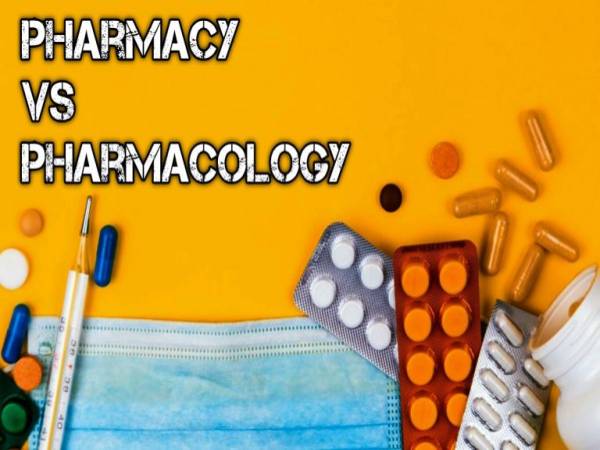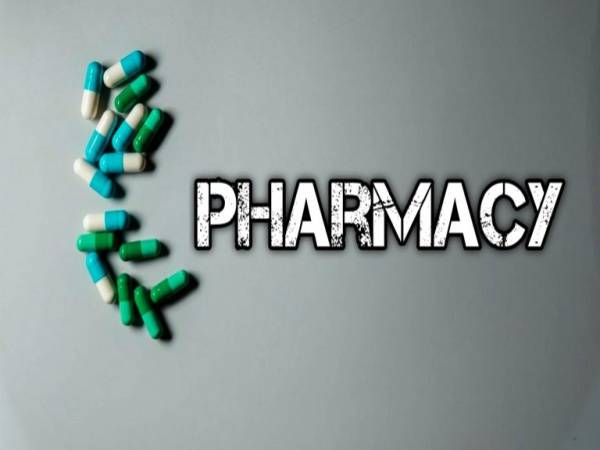Differences Between Pharmacy And Pharmacology

It is easy to confuse pharmacy and pharmacology, the twin subjects. Many people do not perceive or think that there is a difference between the two ideas. Students studying pharmacology and pharmacy are referred to as Pharms even in higher education institutions. As a result, the topic has gotten so confusing that even university students are unsure of whether there is a difference between pharmacy and pharmacology.
What is Pharmacy?

The term pharmacy describes the medical speciality of a chemist. In the course of practising pharmacy, it is the chemist's responsibility to enlighten other medical professionals as well as patients about pharmaceuticals and other medications. Pharmacy, to put it simply, is the art, profession, or practice of creating, preserving, mixing, and dispensing medications or medicines.
Another word for a place is pharmacy. This drugstore is where a pharmacist does her business of dispensing or combining pharmaceuticals.
Pharmacy is what chemists do for a living, as we have already mentioned. Drug manufacturing is a speciality of chemists. They are taught the skills necessary to produce medications in a variety of forms, sizes, patterns, and shapes. Along with this, they are legally authorised to administer drugs and counsel patients and the public on the proper use of prescription medications.
A pharmacy course is offered at the university. In Nigerian universities, the programme lasts for five years on average. Graduates receive a Bachelor of Pharmacy (B.Pharm) degree after the programme. Following their academic studies at the university, pharmacy graduates are required to do a one-year mandatory internship at any government-approved pharmaceutical facility.
READ ALSO » Differences Between School Of Nursing And College Of Nursing
This is done to give the students real-world experience and understanding about the course as well as the career. It is crucial because, like all other medical experts, chemists work with the health and life of their clients. Because of this, they need to be well-trained and prepared to perform the unique work that lies ahead of them.
In Nigeria, there are at least twenty private and state universities that grant pharmacy degrees. Pharmacy is typically taught by a separate faculty that is divided into multiple departments at these universities. The Department of Pharmacology (PCT), Department of Pharmacy Administration and Clinical Pharmacy (PCA), Department of Pharmacognosy and Traditional Medicine (PCG), Department of Pharmaceutical Chemistry (PCH), and Department of Industrial Pharmacy (PCT) are just a few of the departments that make up the Pharmacy Faculty.
What is Pharmacology?

Pharmacology, separate from pharmacy, is the branch of study that examines the many responses, trajectories, and developments of a living organism to one or more specific chemicals. Usually, it studies and keeps a careful eye on how medications and other similar substances affect both humans and animals, as well as the results of these interactions.
The impact and usage of various drug types are the subject of the highly specialised and unique field of pharmacology. Pharmacokinetics is the term for this. It also addresses how various medications affect the body and how the body responds to them. Drug design is also explored in pharmacology.
It does not, however, deal with drug manufacturing, however, this is quickly changing as a growing number of universities have included fundamental concepts of drug discovery in their pharmacology curricula.
Typically, the pharmacy faculty oversees the department of pharmacology. It may, however, be found under the faculty of basic medical sciences, as it is in many postsecondary educational institutions across the nation, depending on the specific institution.
Unfortunately, pharmacology is only offered as a course of study at a very small number of postsecondary institutions roughly four of them. To guarantee that the workforce shortage for pharmaceutical sciences research is filled, it is hoped that this will improve soon.
READ ALSO » 10 Differences Between A Zygote And Foetus
We have a general understanding of the two ideas of pharmacy and pharmacology from the above. We will now explore the core idea of this work, which is to examine the two conceptions under a microscope to identify the differences that distinguish one idea from the other.
Based on the main headings, these are the distinctions between pharmacology and pharmacy.
4 Major Differences between Pharmacy and Pharmacology
- The kind of degree that can be earned
- The Nature of Education
- Career Opportunities
- Type of Work Done
1. The kind of degree that can be earned
The pharmacology degree programme is an undergraduate degree certificate programme that lasts a shorter amount of time, typically 4 years, whereas the pharmacy degree programme is a 5 or even 6-year degree programme that ends in the awarding of a Bachelor of Pharmacy degree (B. Pharm or Pharm D., as the case may be). Upon completion of their four years of studies, successful students receive the Pharmacology Bachelor of Sciences (B. Sc) degree.
2. The Nature of Education
Pharmacology is a subject that pharmacy students are required to take classes on. In actuality, pharmacy students study more than 90% of the same material as pharmacology students, which contributes to the holistic nature of their education.
Although the lectures are condensed and not as thoroughly reviewed and researched as they are for primary pharmacology students, they nevertheless address the practical side of the subject. Nearly all of the coursework that biology students must complete in their four years of study is effectively completed in three years by pharmacy students.
Students studying pharmacology are taught everything there is to know about the subject, along with a small amount of pharmacy. Along with pharmacy students, they also take some basic medical science courses, such as biochemistry. For example, pharmacology students at the University of Lagos in Lagos, Nigeria, also teach pharmacy courses like PCH and PCG.
3. Career Opportunities
In a perfect world, pharmacologists and chemists would perform entirely separate types of work, making it extremely unlikely that one would replace the other. Pharmacists and pharmacists hardly encounter one other outside of pharmaceutical companies and research facilities.
Pharmacists are medical professionals who go through extensive training and education to gain the skills and knowledge needed to handle the unique field they are joining. In the nation where they studied or practised, pharmacists are often admitted into the professional association of pharmacists. Pharmacists have numerous options for professional progression in hospitals, drug businesses, government healthcare facilities, and other settings.
READ ALSO » Top 7 Best Pharmacy Items For Touchy Skin
The main focus of pharmacology is research. Pharmacologists typically find employment in labs and research groups as a result. They are employed by organisations that oversee healthcare as well.
4. Type of Work Done
Pharmacists deal with the creation, formulation, manufacturing, distribution, and counselling of drugs to patients and other interested parties.
However, the duties of pharmacologists include both drug formulation and drug design to examine and ascertain the numerous modes of administration, the effects of various drugs on living things, and the responses these organisms have to pharmaceuticals.
A pharmacist is first a pharmacologist and then a pharmacist. The study of pharmacology consists mostly of a small portion of the work done by pharmacy students; it is but one aspect of pharmacy. Pharmacy is connected to other medical science professions through pharmacology, which is an essential cord.
